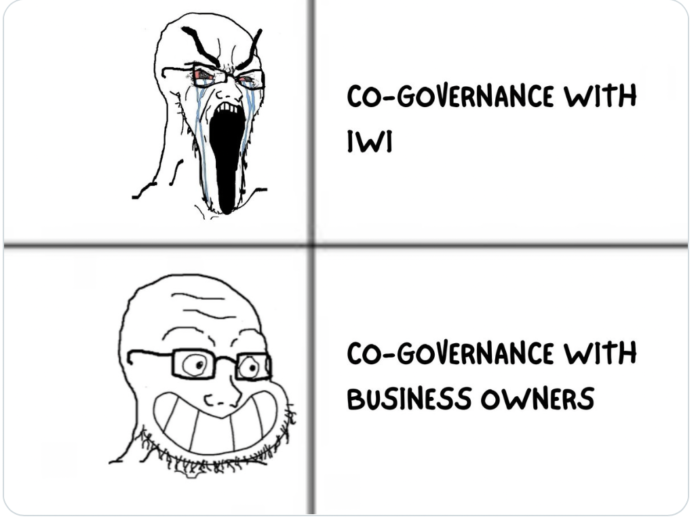One for all those screaming about da Māori stealing da water…
Ngāti Awa wins right to appeal billion-bottles-per-year water plant expansion
An iwi has won the right to appeal a Chinese-owned water bottling plant’s plans to expand its facility and fill nearly a billion bottles from an aquifer in Whakatāne every year.
Creswell NZ, a subsidiary of multi-billion dollar Chinese water bottling giant Nongfu Spring, was granted consent by the Bay of Plenty Regional Council in 2018 to bottle water from the Ōtākiri Aquifer.
However, the issue of consent has been consistently challenged by local iwi Te Rūnanga o Ngāti Awa, which claims the bottling activity would significantly damage the mauri, or life force, of the water which holds special significance to the iwi.
The iwi previously challenged Bay of Plenty Regional Council’s issuing of the consent in cases taken to both the High Court and Environment Court – both of which were unsuccessful.
…here’s co-governance and the Treaty actually saving Pakeha interests!
Seeing as Chinese Banking interests inside Infrastructure NZ were the ones to lead the NZ delegation to Scotland to study their water infrastructure that allows for privatisation, we should work hard to resist their influence.
On a burning planet, we can’t be seen by China as their South Pacific Well.
Increasingly having independent opinion in a mainstream media environment which mostly echo one another has become more important than ever, so if you value having an independent voice – please donate here.
If you can’t contribute but want to help, please always feel free to share our blogs on social media



Don’t know why you are bothering Martyn, people will still turn this into a race thing, you know, ungrateful hori’s trying to steal the water…
We can have effective commanders and military leader
we can have idealistic heros fighting for a genuinely good cause.
Inspiring and honorable warriors willing to die for a cause in service to his god, definitely.
But a good ruler over a kingdom? Oh, hell no.
We don’t need co-governance to say no to China.
seems like we do
Fair point
Good call. Its not democracy and legislates the creation of 2nd class citizens. There has to be a better way to sort historic grievances than by creating new ones.
What is it then? Spell it out and not just consign it to SEP hoping it will go away.
Only an idiot politician would allow water privatisation in New Zealand.
How would “significantly damage the mauri, or life force, of the water which holds special significance to the iwi.” hold up in court?
Does ‘protection of sacred’ in the treaty include this claim?
Does the water flow nearby out to sea like most in NZ or is it an aquafer?
Without the water does it create an environmental issue?
Other than Maori not profiteering from this directly, does the BOP Council? Is it shared with all rate payers which would mean local Iwi’s as well?
If this was not China but Australia would we be so incensed?
Personally – my only issue is if they are using plastics for containment and any environmental damage from pollution – but that’s all business I ask of.
“claims the bottling activity would significantly damage the mauri, or life force, of the water which holds special significance to the iwi” What a joke. We mock religious people for this sort of anti science fake crap but we pretend that Maori have a point.
Maori should not be the only ones to launch appeals – relying on Maori to somehow save NZ assets is a failing strategy.
Dome Valley environment court shows how dangerous this strategy is – when a few members can somehow change their mind with a 2 million dollar housing gift and jobs if they agree with NZ wastemanagement. If iwi get the polluted land back when NZ waste management are finished – what happens if it requires significant money to remediate it? Already have had Auckland Council taxpayers pay for Mobils remediation at the tank farm in Wynyard Quarter.
Assets should be related to the communities around them and laws should be to protect the assets from damage aka in the case of water and land, pollution.
No-one should own water and therefore no-one should have the right to export it. In addition water bottling is highly polluting and should be minimised as a worst case scenario in natural disasters not being sold with meals at McDonalds and becoming a number one polluter of our landfill and seas due to government laziness at regulation.
Comments are closed.